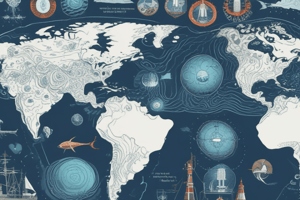Podcast
Questions and Answers
What type of bond forms between water molecules?
What type of bond forms between water molecules?
- Hydrogen bond (correct)
- Polar bond
- Covalent bond
- Ionic bond
Why is ice less dense than liquid water?
Why is ice less dense than liquid water?
- The molecules are tightly packed in ice
- Hydrogen bonds push molecules further apart in ice (correct)
- Liquid water has higher salinity
- Ice molecules have a lower temperature
Which statement correctly describes homeotherms?
Which statement correctly describes homeotherms?
- They have variable body temperatures.
- They produce no internal heat.
- They gain heat from the environment.
- They maintain a constant body temperature. (correct)
What primarily causes ocean tides?
What primarily causes ocean tides?
What effect does increased salinity have on water density?
What effect does increased salinity have on water density?
What is the main outcome when the moon and sun align in terms of tides?
What is the main outcome when the moon and sun align in terms of tides?
Which process allows phytoplankton to capture sunlight?
Which process allows phytoplankton to capture sunlight?
What is the effect of increasing density in colder water during thermohaline circulation?
What is the effect of increasing density in colder water during thermohaline circulation?
In which direction are currents deflected in the Northern Hemisphere?
In which direction are currents deflected in the Northern Hemisphere?
What is a feature of decomposers' cellular respiration process?
What is a feature of decomposers' cellular respiration process?
Which group of macroalgae is classified as brown?
Which group of macroalgae is classified as brown?
What is the effect of global warming on deep sea nutrients?
What is the effect of global warming on deep sea nutrients?
Which type of fish has a breeding cycle that involves hatching in freshwater, migrating to the sea, and returning to freshwater to spawn?
Which type of fish has a breeding cycle that involves hatching in freshwater, migrating to the sea, and returning to freshwater to spawn?
Which type of reproduction typically results in higher genetic variation?
Which type of reproduction typically results in higher genetic variation?
What captures blue light in the ocean before it is absorbed?
What captures blue light in the ocean before it is absorbed?
What is the primary reason that ice is less dense than liquid water?
What is the primary reason that ice is less dense than liquid water?
Which statement accurately describes the effect of hydration on ionic bonds?
Which statement accurately describes the effect of hydration on ionic bonds?
How do ectotherms primarily regulate their body temperature?
How do ectotherms primarily regulate their body temperature?
What drives the movement of deep ocean currents?
What drives the movement of deep ocean currents?
What is a characteristic of homeotherms in relation to their environment?
What is a characteristic of homeotherms in relation to their environment?
What is the primary reason for the decrease in oxygen levels due to global warming?
What is the primary reason for the decrease in oxygen levels due to global warming?
Which process is less energy demanding and involves lower genetic variation?
Which process is less energy demanding and involves lower genetic variation?
In terms of macroalgae characteristics, which is NOT true?
In terms of macroalgae characteristics, which is NOT true?
What is the result of increased pressure as oceanic plates are subducted?
What is the result of increased pressure as oceanic plates are subducted?
Which of the following is NOT a method of sensory reception mentioned?
Which of the following is NOT a method of sensory reception mentioned?
How does anchoring to the same chemical signature during hatching benefit some fish?
How does anchoring to the same chemical signature during hatching benefit some fish?
What happens to density when temperature decreases in water bodies during thermohaline circulation?
What happens to density when temperature decreases in water bodies during thermohaline circulation?
Which factor is considered the first element in a flow chart related to oceanic processes?
Which factor is considered the first element in a flow chart related to oceanic processes?
What type of water movement results from the Coriolis effect?
What type of water movement results from the Coriolis effect?
Which of the following statements about cellular respiration in decomposers is true?
Which of the following statements about cellular respiration in decomposers is true?
Flashcards
Hydrogen Bond in Water
Hydrogen Bond in Water
Weak attraction between a slightly positive hydrogen atom in one water molecule and a slightly negative oxygen atom in another water molecule.
Covalent Bond (Water)
Covalent Bond (Water)
Strong bond holding oxygen and hydrogen atoms together within a single water molecule.
Density of Water vs. Ice
Density of Water vs. Ice
Ice is less dense than liquid water because of the arrangement of water molecules due to hydrogen bonding, pushing them further apart.
Ocean Currents
Ocean Currents
Signup and view all the flashcards
Tides
Tides
Signup and view all the flashcards
Spring Tide
Spring Tide
Signup and view all the flashcards
Coriolis Effect
Coriolis Effect
Signup and view all the flashcards
Thermohaline Circulation
Thermohaline Circulation
Signup and view all the flashcards
Photosynthesis Equation
Photosynthesis Equation
Signup and view all the flashcards
Decomposers
Decomposers
Signup and view all the flashcards
Geostatic Pressure
Geostatic Pressure
Signup and view all the flashcards
Oceanic Plate Subduction
Oceanic Plate Subduction
Signup and view all the flashcards
Photoreception
Photoreception
Signup and view all the flashcards
Chemoreception
Chemoreception
Signup and view all the flashcards
Anadromous Fish
Anadromous Fish
Signup and view all the flashcards
What makes ice less dense?
What makes ice less dense?
Signup and view all the flashcards
Why does water have high heat capacity?
Why does water have high heat capacity?
Signup and view all the flashcards
What causes ocean waves?
What causes ocean waves?
Signup and view all the flashcards
How do surface currents form?
How do surface currents form?
Signup and view all the flashcards
Deep ocean currents
Deep ocean currents
Signup and view all the flashcards
What is Ekman Transport?
What is Ekman Transport?
Signup and view all the flashcards
What happens to ocean density as temperature decreases?
What happens to ocean density as temperature decreases?
Signup and view all the flashcards
What is the impact of global warming on thermohaline circulation?
What is the impact of global warming on thermohaline circulation?
Signup and view all the flashcards
What is Geostatic Pressure?
What is Geostatic Pressure?
Signup and view all the flashcards
How is an oceanic plate subducted?
How is an oceanic plate subducted?
Signup and view all the flashcards
What are the five main types of sensory reception?
What are the five main types of sensory reception?
Signup and view all the flashcards
How is sensory information transmitted to the brain?
How is sensory information transmitted to the brain?
Signup and view all the flashcards
Why is the brain the most energetically demanding tissue?
Why is the brain the most energetically demanding tissue?
Signup and view all the flashcards
What is the relationship between primary production and energy use in animals?
What is the relationship between primary production and energy use in animals?
Signup and view all the flashcards
How do fish use chemoreception?
How do fish use chemoreception?
Signup and view all the flashcards
Study Notes
Oceanography
- Hydrogen has partial positive and oxygen partial negative charges, forming hydrogen bonds between water molecules.
- Hydrogen bonds are weak compared to covalent bonds.
- Water's dipole-ion interaction can break ionic bonds like NaCl.
- Ice is less dense than water due to hydrogen bonds pushing molecules apart.
- Water has a higher heat capacity than air, necessitating more energy to change its temperature.
- Salinity increases in water when ice forms.
Ocean Water Movement
- Ocean currents are driven by wind, plate movement (tsunamis), density, and temperature differences.
- Waves transport water but not necessarily constantly.
- Surface currents are driven by wind.
- Tides are primarily caused by the moon's gravitational pull, with the sun also having an influence.
- Ocean currents are influenced by the Coriolis effect, deflecting to the right in the Northern Hemisphere and left in the Southern Hemisphere.
- Horizontal movement of water.
Thermohaline Circulation
- Phytoplankton use chlorophyll to capture sunlight for photosynthesis.
- Density increases as water gets colder and salinity increases.
- Currents transport oxygen, nutrients, heat, and large volumes of water.
- Global warming can cause less deep-sea nutrients, less oxygen, and colder temperatures in Europe.
Tectonic Plates
- Tectonic plate movement can cause pressure increase as plates get closer to Earth's core.
- Geostatic pressure is the stress exerted by overlying rocks.
- Oceanic plates can subduct to high pressure areas, creating volcanic arcs.
Sensory Biology
- Photoreception senses light.
- Magnetoreception detects magnetic fields.
- Chemoreception detects chemical stimuli (taste and smell).
- Electroreception detects electrical currents.
- Mechanoreception senses pressure, touch, and vibration.
- Sensory stimuli travel to the brain as electrochemical signals.
Macroalgae + Plants
- Brown algae (Phaeophyceae), red algae (Rhodophyta), and green algae (Chlorophyta) are main macroalgae groups.
- Macroalgae lack vascular tissues.
- Photosynthetic macroalgae absorb sunlight; chlorophyll a is key for photosynthesis.
- Light penetration limits macroalgae growth to shallower marine regions.
Breathing + Reproduction
- Anadromous fish are born in freshwater and migrate to the ocean.
- Catadromous fish are born in the ocean and migrate to freshwater.
- Counter-current exchange is more efficient than co-current exchange for gas exchange in gills.
- Asexual reproduction has lower energy demands, few offspring, and low genetic variation.
- Sexual reproduction requires more energy but increases genetic variation through crossing over, mutations, and independent assortment.
Studying That Suits You
Use AI to generate personalized quizzes and flashcards to suit your learning preferences.




